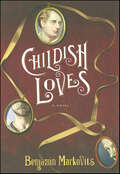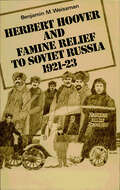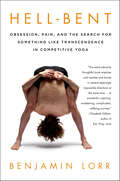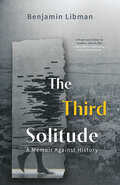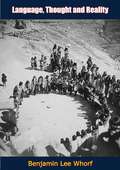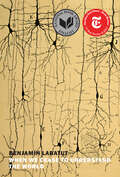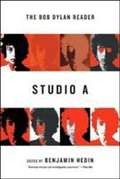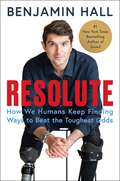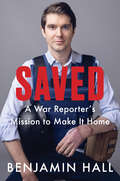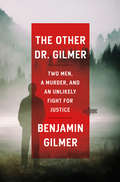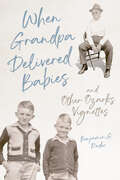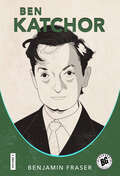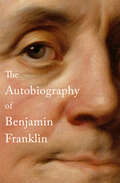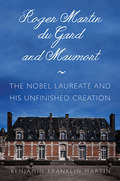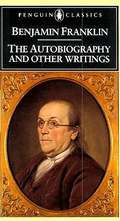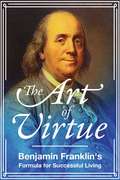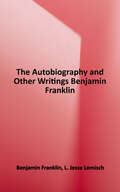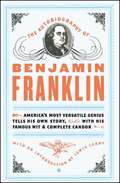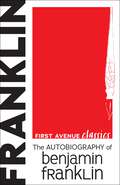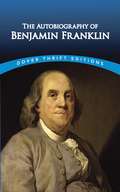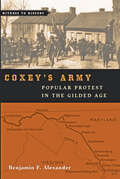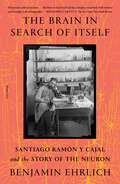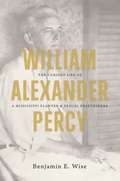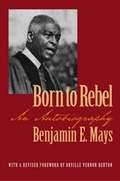- Table View
- List View
Childish Loves: A Novel
by Benjamin MarkovitsThe last piece of a literary puzzle falls into place in the final novel of Benjamin Markovits’s Byron trilogy.When his former colleague Peter Sullivan dies, Ben Markovits inherits unpublished manuscripts about the life of Lord Byron—including the novels Imposture and A Quiet Adjustment. Ben’s own literary career is in the doldrums, and he tries to revive it by publishing and writing about his dead friend, whose reimagining of Byron’s lost memoirs—titled Childish Loves—may provide a key to Sullivan’s own life and tarnished reputation.Acting as a literary sleuth, Ben sorts through boxes of Sullivan’s writing; reads between the lines of his scandalous, Byron-inspired stories; meets with the Society for the Publication of the Dead; and tracks down people from Peter’s past in an effort to untangle rumor from reality. In the process, he crafts a masterful story-within-a-story that turns on uncomfortable questions about childhood and sexual awakening, innocence and attraction, while exploring the lives of three very different writers and their brushes with success and failure in both literature and life.
Herbert Hoover and Famine Relief to Soviet Russia, 1921–1923
by Benjamin M. WeissmanIn 1921 one of the most devastating famines in history threatened the lives of millions of Russians as well as the continuance of Soviet rule. Responding to a plea for help from the Soviet government, the American Relief Administration (ARA) agreed to provide famine relief in the stricken areas. The ARA was a private relief organization headed by Herbert Hoover, then U.S. secretary of commerce and one of the best-known Americans of his time for his spectacular success in rescuing the population of Belgium from starvation during World War I and in feeding millions of Europeans during the Armistice. Hoover was also a retired capitalist of considerable wealth, a champion of Republican liberalism, and a leading opponent of recognition of Soviet Russia. Lenin—head of the Soviet government, leader of the Bolshevik party, and living symbol of world revolution—was the antithesis of the ARA's chief. This book studies the personalities, motives, and modi operandi of these two celebrated figures, both as individuals and as representatives of their societies. At the same time it considers the relief mission itself, which has been the subject of continuing controversy for fifty years. Its partisans see it as a charitable, nonpolitical enterprise, while its enemies judge it an anti-Soviet intervention entirely devoid of humanitarian purpose. Herbert Hoover and Famine Relief for Soviet Russia is the first major attempt by an American scholar to reexamine the ARA mission, on the basis of much material made available since the ARA's 1927 official history. What emerges is, on the one hand, a painstaking examination of the historical details of ARA's mission and, on the other hand, a philosophic essay relating the ARA to broader questions of U.S.-Soviet relations the ideological antitheses of Hoover and Lenin. The author concludes that both sides overcame their ideological antagonisms and made possible a spectacularly successful relief mission that inspired the vain hope that a new era in Soviet-American relations had begun.
Hell-Bent: Obsession, Pain, and the Search for Something Like Transcendence in Competitive Yoga
by Benjamin LorrAuthor Benjamin Lorr wandered into a yoga studio—and fell down a rabbit holeHell-Bent explores a fascinating, often surreal world at the extremes of American yoga. Benjamin Lorr walked into his first yoga studio on a whim, overweight and curious, and quickly found the yoga reinventing his life. He was studying Bikram Yoga (or "hot yoga") when a run-in with a master and competitive yoga champion led him into an obsessive subculture—a group of yogis for whom eight hours of practice a day in 110- degree heat was just the beginning.So begins a journey. Populated by athletic prodigies, wide-eyed celebrities, legitimate medical miracles, and predatory hucksters, it's a nation-spanning trip—from the jam-packed studios of New York to the athletic performance labs of the University of Oregon to the stage at the National Yoga Asana Championship, where Lorr competes for glory. The culmination of two years of research, and featuring hundreds of interviews with yogis, scientists, doctors, and scholars, Hell-Bent is a wild exploration. A look at the science behind a controversial practice, a story of greed, narcissism, and corruption, and a mind-bending tale of personal transformation, it is a book that will not only challenge your conception of yoga, but will change the way you view the fragile, inspirational limits of the human body itself.
The Third Solitude: A Memoir Against History
by Benjamin Libman“A frank love letter to modern Jewish life.” — MERVE EMRE, contributing writer, The New YorkerAn intimate memoir in essays seeking familial history and personal memory against the backdrop of the lost world of North American Jewry.What is the past? How can we let it speak on its own terms, without forcing it into the categories of history? In The Third Solitude, Benjamin Libman gathers and weaves the threads of multiple pasts — of his community, of his family, and of himself — in an attempt to escape the inadequate narratives around Zionism that he grew up with, and to create nothing short of a new paradigm. Across a series of interconnected memories, Libman leads us through the many fragments that make a life, unafraid to question deeply cherished beliefs about Jewish identity, and seeks to reconcile his own values with those inculcated in him. Along the way, he casts aside tired tropes and shores together the pieces of a new way of looking toward the future. The Third Solitude is a paean to the art of losing, and to the visions of the past that persist in the present..
Language, Thought and Reality: Selected Writings (The\mit Press Ser.)
by Benjamin Lee WhorfWritings by the pioneering linguist Benjamin Whorf, including his famous work on the Hopi language as well as general reflections on language and meaning. The pioneering linguist Benjamin Whorf (1897–1941) grasped the relationship between human language and human thinking: how language can shape our innermost thoughts. His basic thesis is that our perception of the world and our ways of thinking about it are deeply influenced by the structure of the languages we speak. The writings collected in this volume include important papers on the Maya, Hopi, and Shawnee languages as well as more general reflections on language and meaning.—Print ed.
When We Cease to Understand the World
by Benjamin LabatutShortlisted for the 2021 International Booker Prize A fictional examination of the lives of real-life scientists and thinkers whose discoveries resulted in moral consequences beyond their imagining.When We Cease to Understand the World is a book about the complicated links between scientific and mathematical discovery, madness, and destruction. Fritz Haber, Alexander Grothendieck, Werner Heisenberg, Erwin Schrödinger—these are some of luminaries into whose troubled lives Benjamín Labatut thrusts the reader, showing us how they grappled with the most profound questions of existence. They have strokes of unparalleled genius, alienate friends and lovers, descend into isolation and insanity. Some of their discoveries reshape human life for the better; others pave the way to chaos and unimaginable suffering. The lines are never clear.At a breakneck pace and with a wealth of disturbing detail, Labatut uses the imaginative resources of fiction to tell the stories of the scientists and mathematicians who expanded our notions of the possible.
Studio A: The Bob Dylan Reader
by Benjamin HedinThis book presents Bob Dylan's unique literary legacy in a collection that gathers over fifty articles, poems, essays, speeches, literary criticisms, and interviews; many previously unpublished.
Resolute: How We Humans Keep Finding Ways to Beat the Toughest Odds
by Benjamin HallThe author of the #1 New York Times bestseller Saved tells the remarkable story of his harrowing recovery after surviving a deadly Russian missile attack in Ukraine, and shares the most profound lessons he learned about the power of resilience. <p> After suffering horrific, nearly-fatal injuries while covering the war in Ukraine in 2022, Benjamin Hall was told he’d need to spend two years in a hospital learning how to walk again. Instead, he made it home to his family in just six months. Sustained by his positive attitude and relentless will to keep moving forward, Hall impressed and inspired all those who followed his story and progress, with many wondering how they could bottle his seemingly superhuman resolve. <p> Now with a greater degree of perspective, Hall analyzes the psychological aftermath of the Russian missile attack that profoundly altered his life. A clear-eye work of journalism and personal meditation elevated by remarkable storytelling, Resolute is Hall’s probing inquiry into why he is alive and thriving today. As he confronts his own mortality, Hall analyzes the key factors that allowed him to survive the missile attack, endure multiple surgeries, adapt to new prosthetics, and cope with the psychological burdens of severe trauma. <p> Each chapter features powerful stories from Hall’s arduous recovery, interwoven with expert advice and insights from the extraordinary people he encountered along the way—doctors who heal broken bodies and damaged souls; therapists who push despairing patients to discover the depths of perseverance; scientists who have studied how the body and mind are sustained under unfathomable duress; and families who exhibit exceptional strength in the face of sudden tragedy. <p> Resolute is more than a survival story—it is a testament to the saving power of the human spirit. From embracing post-traumatic optimism to discovering untapped stores of tenacity, this book is a roadmap for those looking to discover and fortify their own powers of resilience and persevere against the odds. As Hall shares the vivid and inspiring account of his own survival, he implores us to consider that these reservoirs of strength and resolve are inherent to our humanity—and reside within each of us, too. <b>New York Times Bestseller</b>
Saved: A War Reporter's Mission to Make It Home
by Benjamin HallWhen veteran war reporter Benjamin Hall woke up in Kyiv on the morning of March 14, 2022, he had no idea that, within hours, Russian bombs would nearly end his life. As a journalist for Fox News, Hall had worked in dangerous war zones like Syria and Afghanistan, but with three young daughters at home, life on the edge was supposed to be a thing of the past. Yet when Russia viciously attacked Ukraine in February 2022, Hall quickly volunteered to go. A few weeks later, while on assignment, Hall and his crew were blown up in a Russian strike. With Hall himself gravely injured and stuck in Kyiv, it was unclear if he would make it out alive. <p><p>This is the story of how he survived—a story that continues to this day. For the first time, Hall shares his experience in full—from his ground-level view of the war to his dramatic rescue to his arduous, and ongoing, recovery. Going inside the events that have permanently transformed him, Hall recalls his time at the front lines of our world’s conflicts, exploring how his struggle to step away from war reporting led him back one perilous last time. Featuring nail-biting accounts from the many people across multiple countries who banded together to get him to safety, Hall offers a stunning look at complex teamwork and heartfelt perseverance that turned his life into a mission. <p><p>Through it all, Hall’s spirit has remained undaunted, buoyed by that remarkable corps of people from around the world whose collective determination ensured his survival. <p><p>Evocative, harrowing, and deeply moving, Saved is a powerful memoir of family and friends, of life and healing, and of how to respond when you are tested in ways you never thought possible.Benjamin Hall’s memoir includes a 16-page color photo insert. <p> <b>New York Times Bestseller</b>
The Other Dr. Gilmer: Two Men, a Murder, and an Unlikely Fight for Justice
by Benjamin GilmerA powerful true story about a shocking crime and a mysterious illness that will forever change your notions of how we punish and how we heal—an expansion on one of the most popular This American Life episodes of all time&“A remarkable medical detective story–cum–memoir, grippingly told . . . I was drawn in by every part of it.&”—Atul Gawande, #1 New York Times bestselling author of Being MortalFresh out of medical residency, Dr. Benjamin Gilmer joined a rural North Carolina clinic only to find that its previous doctor shared his last name. Dr. Vince Gilmer was loved and respected by the community—right up until he strangled his ailing father and then returned to the clinic for a regular week of work. Vince&’s eventual arrest for murder shocked his patients. How could their beloved doctor be capable of such violence? The deeper Benjamin looked into Vince&’s case, the more he became obsessed with discovering what pushed a good man toward darkness. When Benjamin visited Vince in prison, he met a man who appeared to be fighting his own mind, constantly twitching and veering into nonsensical tangents. Sentenced to life in prison, Vince had been branded a cold-blooded killer and a &“malingerer&”—a person who fakes an illness. But it was obvious to Benjamin that Vince needed help. Alongside This American Life journalist Sarah Koenig, Benjamin resolved to understand what had happened to his predecessor. Time and again, the pair came up against a prison system that cared little about the mental health of its inmates—despite more than a third of them suffering from mental illness. The Other Dr. Gilmer takes readers on a riveting and heart-wrenching journey through our shared human fallibility, made worse by a prison system that is failing our most vulnerable citizens. With deep compassion and an even deeper sense of justice, Dr. Benjamin Gilmer delves into the mystery of what could make a caring doctor commit a brutal murder. And in the process, his powerful story asks us to answer a profound question: In a country with the highest incarceration rates in the world, what would it look like if we prioritized healing rather than punishment?
When Grandpa Delivered Babies and Other Ozarks Vignettes
by Benjamin G. RaderPeople in the Ozarks have long told humorous vignettes that make sense of triumph and tragedy, relay family and local history, and of course entertain. Benjamin G. Rader’s memoir offers a loving portrait of the Ozarks of his youth, where his grandfather midwifed babies and his great uncle Jerry Rader laughed so hard at one of his own stories that he choked to death on a pork chop. As he reveals the Ozarks of the 1930s through 1950s, Rader dispels the myths of the region’s people as isolated and sharing a single set of values and behaviors. He also takes readers inside the life of the extended Rader family and its neighborhoods, each of which drew on storytelling to strengthen resolve in lives roiled by change, economic depression, and the shift of daily life from the country to the city. An alluring blend of remembering and reflection, When Grandpa Delivered Babies and Other Ozarks Vignettes provides a vivid portrait of a fading time.
Ben Katchor (Biographix #2)
by Benjamin FraserThe recipient of a 2000 MacArthur fellowship, Ben Katchor (b. 1951) is a beloved comics artist with a career spanning four decades. Published in indie weeklies across the United States, his comics are known for evoking the sensorium of the modern metropolis. As part of the Biographix series edited by Frederick Luis Aldama, Ben Katchor offers scholars and fans a thorough overview of the artist’s career from 1988 to 2020. In some of his early strips published in the 1980s in the New York Press and Forward, Katchor introduced one of his quintessential characters, Julius Knipl, a real estate photographer. By crafting Knipl as an urban flâneur prone to wandering, Katchor was able to variously demonstrate his absurd humor and linguistic whimsy alongside narratives packed with social critique. Three volumes collecting the Julius Knipl strips, Julius Knipl, Real Estate Photographer; Cheap Novelties: The Pleasures of Urban Decay; and The Beauty Supply District, helped cement Katchor as a distinguished comics artist and social commentator. Later works, such as The Cardboard Valise, Hand-Drying in America, and The Dairy Restaurant, have diversified his comics legacy. Rooted in close analyses of the artist’s numerous series and collections, each chapter in Ben Katchor is dedicated to a distinct aspect of the urban experience. Individual pages from Katchor’s work depict not only the visual, but also the auditory, tactile, and olfactory dimensions of life in the city.
The Autobiography of Benjamin Franklin: With Notes And A Sketch Of Franklin's Life From The Point Where The Autobiography Ends (Classic Bks.)
by Benjamin Franklin VThe memoirs of a brilliant and beloved Founding Father Printer, author, scientist, inventor, statesman, revolutionary—arguably no American life has been more remarkable than Benjamin Franklin&’s.Penned between 1771 and 1790 and published after his death, the unfinished Autobiography of Benjamin Franklin is one of the most acclaimed and widely read personal histories ever written. From his youth as a printer&’s assistant working for his brother&’s Boston newspaper through his own publishing, writing, and military careers, his scientific experiments and worldwide travels, his grand triumphs and heartbreaking tragedies, Franklin tells his story with aplomb, bringing to life the flesh-and-blood man behind the American icon.This ebook has been professionally proofread to ensure accuracy and readability on all devices.
Roger Martin du Gard and Maumort: The Nobel Laureate and His Unfinished Creation
by Benjamin Franklin MartinIn the late 1930s and early 1940s, Roger Martin du Gard was one of the most famous writers in the Western world. He won the Nobel Prize for Literature in 1937, and his works, especially Les Thibault, a multivolume novel, were translated into English and read widely. Today, this close friend of André Gide, Albert Camus, and André Malraux is almost unknown, largely because he left unfinished the long project he began in the 1940s, Lieutenant Colonel de Maumort. Initially, the novel is an account of the French experience during World War II and the German occupation as seen through the eyes of a retired army officer. Yet, through Maumort's series of recollections, it becomes a morality tale that questions the values of late nineteenth- and early twentieth-century European civilization. A fragmentary version of the novel was published in 1983, twenty-five years after its author's death, and an English translation appeared in 1999. Even incomplete, it is a work of haunting brilliance. In this groundbreaking study, Benjamin Franklin Martin recovers the life and times of Roger Martin du Gard and those closest to him. He describes the genius of Martin du Gard's literature and the causes of his decline by analyzing thousands of pages from journals and correspondence. To the outside world, the writer and his family were staid representatives of the French bourgeoisie. Behind this veil of secrecy, however, they were passionate and combative, tearing each other apart through words and deeds in clashes over life, love, and faith. Martin interweaves their accounts with the expert narration that distinguishes all of his books, creating a blend of intellectual history, family drama, and biography that will appeal to scholars, students, and general readers alike.
Autobiography and Other Writings
by Benjamin FranklinBenjamin Franklin's writings represent a long career of literary, scientific, and political efforts over a lifetime which extended nearly the entire eighteenth century. Franklin's achievements range from inventing the lightning rod to publishing Poor Richard's Almanack to signing the Declaration of Independence. In his own lifetime he knew prominence not only in America but in Britain and France as well. This volume includes Franklin's reflections on such diverse questions as philosophy and religion, social status, electricity, American national characteristics, war, and the status of women. Nearly sixty years separate the earliest writings from the latest, an interval during which Franklin was continually balancing between the puritan values of his upbringing and the modern American world to which his career served as prologue. This edition provides a new text of the Autobiography, established with close reference to Franklin's original manuscript. It also includes a new transcription of the 1726 journal, and several pieces which have recently been identified as Franklin's own work.
The Art of Virtue: Ben Franklin's Formula for Successful Living
by Benjamin FranklinAn indispensable guide to right living from a Founding Father. Benjamin Franklin, one of our nation’s most revered founders, was a man of uncommonly fine common sense. Although he was never able to finish his project of compiling a comprehensive compendium of practical wisdom, he was able to lay down the beginnings of this work in his later writings. Collected within this volume are Franklin's writings organized around his timeless philosophy on living well, containing his thoughts on justice, moderation, chastity, and more. The Art of Virtue is a simple, concise, and illuminating guide to living a virtuous and fulfilling life. Perfect for readers young and old alike.
The Autobiography and Other Writings
by Benjamin FranklinA comprehensive and insightful compilation of Benjamin Franklin's The Autobiography and other essays which offers an in-depth look into the life of America's most fascinating Founding Father. Benjamin Franklin was a true Renaissance man- writer, publisher, scientist, inventor, diplomat, and politician. During his long life, he offered advice on attaining wealth, organized public institutions, contributed to the birth of a nation, and negotiated with foreign powers to ensure his country's survival. Through the words of the elder statesman himself, The Autobiography and Other Writings presents a remarkable insight into the man and his accomplishments. Additional writings from Benjamin Franklin's wife and son provide a more intimate portrait of the husband and father who became a legend in his own time.
The Autobiography of Benjamin Franklin
by Benjamin FranklinOriginally intended as a guide for his son, Benjamin Franklin details his unique and eventful life as an inventor, writer, athlete, scientist, writer and diplomat.
The Autobiography of Benjamin Franklin
by Benjamin Franklin"The first book to belong permanently to literature. It created a man." -- From the Introduction Few men could compare to Benjamin Franklin. Virtually self-taught, he excelled as an athlete, a man of letters, a printer, a scientist, a wit, an inventor, an editor, and a writer, and he was probably the most successful diplomat in American history. David Hume hailed him as the first great philosopher and great man of letters in the New World. Written initially to guide his son, Franklin's autobiography is a lively, spellbinding account of his unique and eventful life. Stylistically his best work, it has become a classic in world literature, one to inspire and delight readers everywhere.
The Autobiography of Benjamin Franklin: And A Sketch Of Franklin's Life From The Point Where The Autobiography Ends, Drawn Chiefly From His Letters; From His Birth In 1706 To The Publication Of The First Number Of Poor Richard's Almanac In 1732 (First Avenue Classics ™)
by Benjamin FranklinBetween 1771 and 1790, American Founding Father Benjamin Franklin sat down to record the important events of his life, from his childhood in Boston to his work as a printer in Philadelphia, to his trips to Paris and his plans for the first public library. The story of the invention of the Franklin stove, the first Poor Richard's Almanac, and his experiments with electricity are all included here. His "Project for Moral Perfection"—a list of desirable virtues and steps to achieve them—influenced the modern self-help genre. Hundreds of years later, Franklin's account of his rise from middle-class obscurity to become a world-renowned scholar and civic figure continues to promote the American Dream. First published in 1791, this unabridged version of Franklin's autobiography is taken from the 1909 copyright edition.
The Autobiography of Benjamin Franklin: The Classic American Autobiography By Ben Franklin (Dover Thrift Editions)
by Benjamin FranklinBlessed with enormous talents and the energy and ambition to go with them, Franklin was a statesman, author, inventor, printer, and scientist. He helped draft the Declaration of Independence and later was involved in negotiating the peace treaty with Britain that ended the Revolutionary War. He also invented bifocals, a stove that is still manufactured, a water-harmonica, and the lightning rod. Franklin's extraordinary range of interests and accomplishments are brilliantly recorded in his Autobiography, considered one of the classics of the genre. Covering his life up to his prewar stay in London as representative of the Pennsylvania Assembly, this charming self-portrait recalls Franklin's boyhood, his determination to achieve high moral standards, his work as a printer, experiments with electricity, political career, experiences during the French and Indian War, and more. Related in an honest, open, unaffected style, this highly readable account offers a wonderfully intimate glimpse of the Founding Father sometimes called "the wisest American."
Coxey's Army: Popular Protest in the Gilded Age (Witness to History)
by Benjamin F. AlexanderA colorful study of the nineteenth century march on Washington, the man who led it, and the national sensation that prefigured the New Deal.In 1893, America was suffering a serious economic depression. Fed up with government inactivity, Populist agitator Jacob S. Coxey led hundreds of unemployed laborers on a march from Massillon, Ohio, to Washington, D.C. Their intention was to present a “petition in boots” for government-financed jobs building and repairing the nation’s roads. On May 1, the Coxeyites descended on the center of government, where a melee ensued between them and the police. Soon, other Coxey-inspired contingents were on their way east from places as far away as San Francisco and Portland. Some even hijacked trains along the way.In Coxey’s Army, Benjamin F. Alexander brings Coxey and his fellow leaders to life, along with the reporters and spies who traveled with them and the captivated readers who followed the story in the newspapers. Alexander explains how the Coxeyite demands fit into a larger history of economic theory and the labor movement. Despite running a gauntlet of ridicule, the marchers laid down a rough outline of what emerged decades later as the New Deal.
The Brain in Search of Itself: Santiago Ramón y Cajal and the Story of the Neuron
by Benjamin EhrlichThe first major biography of the Nobel Prize–winning scientist who discovered neurons and transformed our understanding of the human mind—illustrated with his extraordinary anatomical drawingsUnless you’re a neuroscientist, Santiago Ramón y Cajal is likely the most important figure in the history of biology you’ve never heard of. Along with Charles Darwin and Louis Pasteur, he ranks among the most brilliant and original biologists of the nineteenth century, and his discoveries have done for our understanding of the human brain what the work of Galileo and Sir Isaac Newton did for our conception of the physical universe. He was awarded the Nobel Prize in 1906 for his lifelong investigation of the structure of neurons: “The mysterious butterflies of the soul,” Cajal called them, “whose beating of wings may one day reveal to us the secrets of the mind.” And he produced a dazzling oeuvre of anatomical drawings, whose alien beauty grace the pages of medical textbooks and the walls of museums to this day.Benjamin Ehrlich’s The Brain in Search of Itself is the first major biography in English of this singular figure, whose scientific odyssey mirrored the rocky journey of his beloved homeland of Spain into the twentieth century. Born into relative poverty in a mountaintop hamlet, Cajal was an enterprising and unruly child whose ambitions were both nurtured and thwarted by his father, a country doctor with a flinty disposition. A portrait of a nation as well a biography, The Brain in Search of Itself follows Cajal from the hinterlands to Barcelona and Madrid, where he became an illustrious figure—resisting and ultimately transforming the rigid hierarchies and underdeveloped science that surrounded him. To momentous effect, Cajal devised a theory that was as controversial in his own time as it is universal in ours: that the nervous system is comprised of individual cells with distinctive roles, just like any other organ in the body. In one of the greatest scientific rivalries in history, he argued his case against Camillo Golgi and prevailed.In our age of neuro-imaging and investigations into the neural basis of the mind, Cajal is the artistic and scientific forefather we must get to know. The Brain in Search of Itself is at once the story of how the brain as we know it came into being and a finely wrought portrait of an individual as fantastical and complex as the subject to which he devoted his life.
William Alexander Percy
by Benjamin E. WiseIn this evocative biography, Benjamin E. Wise presents the singular life of William Alexander Percy (1885-1942), a queer plantation owner, poet, and memoirist from Mississippi. Though Percy is best known as a conservative apologist of the southern racial order, in this telling Wise creates a complex and surprising portrait of a cultural relativist, sexual liberationist, and white supremacist.We follow Percy as he travels from Mississippi around the globe and, always, back again to the Delta. Wise's exploration brings depth and new meaning to Percy's already compelling life story--his prominent family's troubled history, his elite education and subsequent soldiering in World War I, his civic leadership during the Mississippi River flood of 1927, his mentoring of writers Walker Percy and Shelby Foote, and the writing and publication of his classic autobiography, Lanterns on the Levee. This biography sets Percy's life and search for meaning in the context of his history in the Deep South and his experiences in the gay male world of the early twentieth century. In Wise's hands, these seemingly disparate worlds become one.
Born To Rebel: An Autobiography
by Benjamin E. MaysBorn the son of a sharecropper in 1894 near Ninety Six, South Carolina, Benjamin E. Mays went on to serve as president of Morehouse College for twenty-seven years and as the first president of the Atlanta School Board. His earliest memory, of a lynching party storming through his county, taunting but not killing his father, became for Mays an enduring image of black-white relations in the South. Born to Rebel is the moving chronicle of his life, a story that interlaces achievement with the rebuke he continually confronted.
